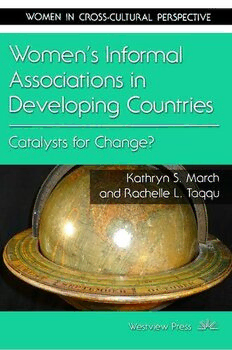
Women's Informal Associations in Developing Countries: Catalysts for Change? PDF
Preview Women's Informal Associations in Developing Countries: Catalysts for Change?
WOMEN IN CROSS-CULTURAL PERSPECTIVE • Women's Informal Associations in Developing Countries WOMEN IN CROSS-CULTURAL PERSPECTIVE Sue-Ellen Jacobs, University of Washington, series editor About the Book and Authors Informal associations among women in developing countries constitute an important source of vitality and integrity for women. This· book evaluates the impact of development programs on women's informal associations and sharpens our understanding of them. The participation of women in development via their informal networks presents a dilemma insofar as intervention by development organizations into the informal sphere often forces women to use their associational resources defensively and, at times, even insulates them from development itself. The authors look at credit, labor, ritual, and religious associations; compare structures; describe differences; and assess the capacity of these women's organizations to make use of developmental assistance. They conclude that mobilizing existing associations is often an inappropriate development strategy, and they advise the creation of new associations "by analogy"-using knowledge of informal organizational structures to generate new groups modeled after the old. Kathryn S. March is assistant professor of anthropology, women's studies, and Asian studies at Cornell University and is a fellow at Mary Ingraham Bunting Institute, Radcliffe College. Rachelle L Taqqu received her MBA from the Cornell Graduate School of Management and has taught at both Stanford and Cornell universities. PENN STATE • UNIVERSITY LIBRARIES Women's Informal Associations in Developing Countries Catalysts for Change? Kathryn S. March and Rachelle L. Taqqu Westview Press / Boulder and London \ W=n in Cro.1.!-Cultural Perspectiw This Westview softcover edition was manufactured on our own premises using equipment and methods that allow us to keep even specialized books in stock. It is printed on acid-free paper and bound in softcovers that carry the highest rating of the National Association of State Textbook Administrators, in consultation with the Association of American Publishers and the Book Manufacturers' Institute. All rights reserved. No part of this publication may be reproduced or transmitted in any brm or by any means, electronic or mechanical, including photocopy, recording, or any information storage and retrieval system without permission in writing from the publisher. Copyright © 1986 by Kathryn S. March and Rachelle L. Taqqu Published in 19!!6 in the United States of America by Westview Press, lnc.; Frederick A. Praegcr, Publisher; 5500 Central Avenue, Boulder, Colorado 80301 Library of Congress Cataloging in Publication Data March, Kathryn S. Women's informal associations in developing countries. Bibliography: p. Includes index. 1. Women's networks- Developing countries. I. Taqqu, U. Rachelle. Title. HQ1870.9.M37 1986 305.4'09172'4 84-19664 ISBN 0-86531-856-5 Composition for this book was provided by the authors. This book was produced without formal editing by the publisher. Printed and bound in the United States of America The paper used in this publication meets the minimum requirements of the American National Standard for Permanence of Paper for Printed Library Materials 239.48-1984. 6 5 4 3 2 1 Contents Preface 1X Acknowledgments xiii PART ONE: WOMEN'S INFORMAL ASSOCIATIONS IN PERSPECTIVE 1. TOW ARD A DEFINmON 1 Legitimacy and Law 1 StructUl'e of Formal and Informal Associations 6 The Problem 8 2. WOMEN'S INFORMAL ASSOCIATIONS 11 Public Versus Private 11 Descent-Based Constituencies 19 Alliances After Marriage 21 Solidarity, Legitimacy, and Power 25 Shahsevan: An Introduction to the Women's World 26 PART TWO: DYNAMICS OF THE INFORMAL SPHERE 3. INFORMAL ASSOCIATIONS: DEFENSIVE OR ACTIVE ? 33 Active and Reactive Strategies 33 The 'Woman Network' as a Defensive Strategy 34 Solidarity as an Active Strategy 40 4. WOMEN'S ECONOMIC ASSOCIATIONS: PATTERNS IN THE REDISTRIBUTION OF RESOURCES 45 Economic Bases for Organization 45 Figure 1: Identifying Women's Informal Associations 46 Rotating Associations 54 5. WOMEN'S RITUAL AND REUGIOUS ASSOCIATIONS: PATTERNS OF AUTHORITY AND POWER 67 Resistance and Change 68 Ritual Leadership and Secular Power 72 An Autonomous Religious Authority? 75 PART THREE: LINKAGES TO THE FORMAL SPHERE 89 6. PERSONAL CONNECTIONS Leadership in Defensive Networks 89 95 Leadership in Active Associations 98 Communication as Change Planning Change Through Informal Leaders 100 7. INSTITUTIONAL LINKAGES AND GROUP ORGANIZATION FOR DEVELOPMENT 103 Formalizing Informal Associations 103 Appropriate Organization for Intervention 108 Figure Z: Strategies for Intervention 116 Complexity in Change 117 8. SOME CONCLUDING GUIDELINES 121 Bibliography 125 Index 145
